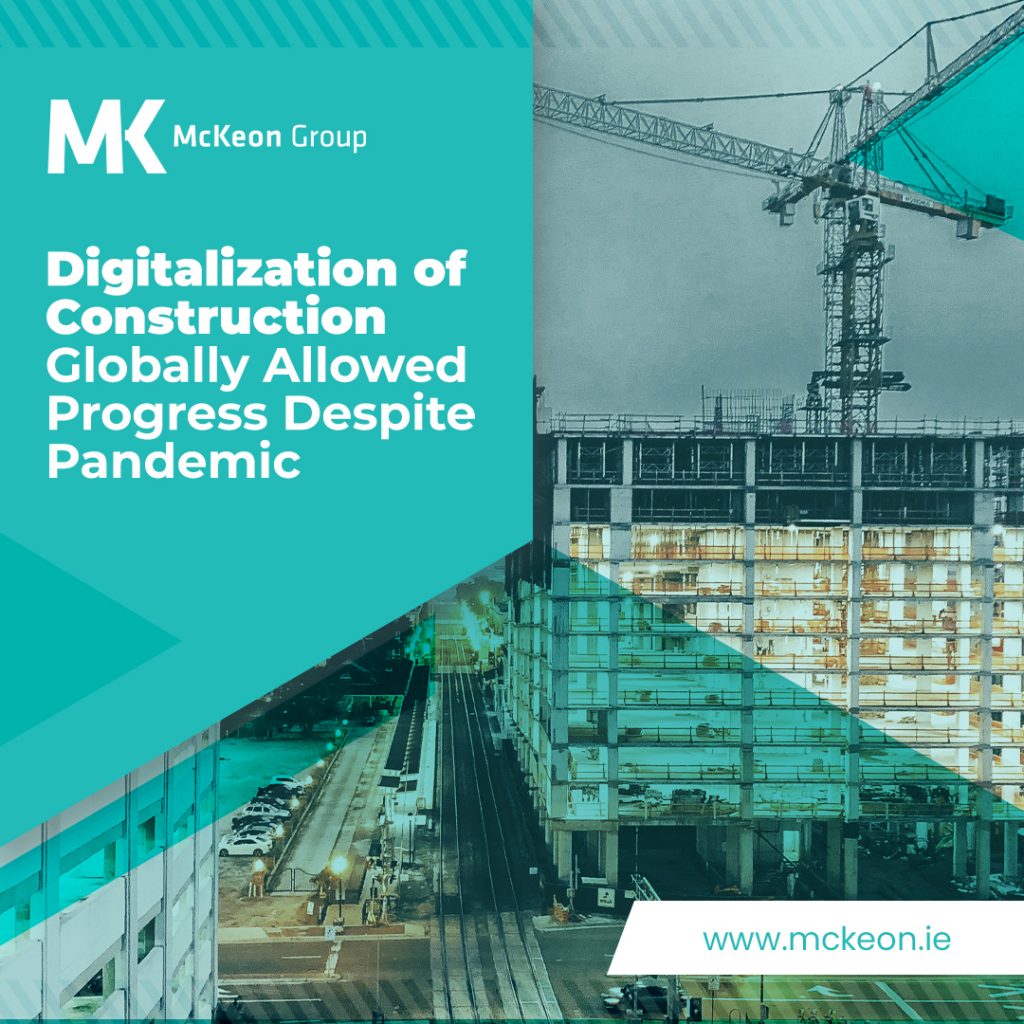Digitalization of Construction Allowed Progress Despite Pandemic
Digitalization of Construction Allowed Progress Despite Pandemic
27/08/2021
Unable to operate normally, COVID-19 hit global construction hard. With material shortages, prolonged lockdowns, labour disruptions, and financing challenges, construction outputs for many sectors fell. This inability to conduct business as usual led to the global construction sector shrinking by 3.1% in 2020, 5.3% excluding China, a decline unseen since the financial collapse of 2008.
Irish construction experienced the most severe restrictions and shutdowns, and still, housing output exceeded expectations – such is the tenacity of our industry. However, the first three months of this year recorded a 21 percent drop in production when compared with Q1 2020. Estimates predict that just 16,000 to 19,000 homes will now be built this year, a far cry from the 35,000 Ireland needs to address the housing crisis. While this slow progress is largely due to the Irish industry being shut down for the first quarter of 2021, progress was slow even in countries where construction could continue.
In an article for WorldBank.org, a team of analysts, consultants, and regulatory specialists have detailed how digitalization helped some in the industry continue working. Namely, the article points out how the digitalization of permit approval and virtual inspections allowed the construction sector in some countries to continue. Unhampered by stay at home orders, these digital solutions allowed progress even during the height of the pandemic. You can read the article in full here: https://blogs.worldbank.org/developmenttalk/building-during-pandemic-disruption-and-digital-transformation-construction and below are just a few of the more interesting global insights.
Digitalization of Permits
Disruption to the construction industry came in large part from social distancing orders. Governments around the world attempted to limit the transmission of the disease through measures that reduced the proximity of people to one another. For construction, this proved difficult, with one-way systems and limited workforce numbers creating bottlenecks in production.
The Los Angeles Department of Buildings, for example, implemented 16 rules recommended by the Center for Disease Control and Prevention. Similar to Ireland, these included on-site controls such as social distancing, face coverings, and handwashing, with mandatory compliance inspections.
One of the positives to come from the disruption, however, is the renewed interest in how digital tools can help the industry.
The digitizing of the permit process is one area that has seen particular focus. Countries with a fully digital permit granting process saw their construction industry continue despite the unprecedented issues. In these countries, planning, zoning, and permission granting were streamlined and conducted remotely, meaning little to no disruption to the process.
Online portals that facilitate the permit process have been around since 2007. Singapore’s online permit platform can even be traced back to 2001, now allowing digital building plans to be submitted remotely. With a completely paperless process, the checking and approval of plans continued undisrupted by COVID-19, despite a total lockdown in April and May of 2020.
Other countries, such as Morocco, improved their own digital facilities with their Rokhas platform. Improving functionality, they allowed video conference calls to review plans. Elsewhere, Yangon (Myanmar) and Benin digitized their application processes to keep the industry moving forward.
With Ireland’s Build Digital project, the hope is that Irish construction will soon reap the same benefits, incorporating digital practices into the industry from start to finish. Amongst other innovations, the Build Digital plans include a provision to digitize the planning application process.
Virtual Inspections
As well as progress in digitalizing the planning process, authorities across the globe also had the issue of quality control to contend with. Under strict stay-at-home orders, many inspection officials were unable to visit sites freely. While some countries had to simply slow or stop construction, others fared a lot better thanks to digital tools.
Kuwait, for example, replaced in-person inspections with digital photographs. These high-quality photographs allowed qualified engineers to conduct quality control remotely, keeping worksites moving forward. Miami, USA, implemented their own form of virtual inspection. Using Microsoft Teams or Zoom, engineers there are now regularly in contact with control officials. In the United Arab Emirates, inspection has taken even greater strides towards digitalization with the regular use of aerial drones. These allow remote, virtual inspections of job sites and make it safer to inspect dangerous locations.
Remaining Challenges
The WorldBank report authors believe there are still some unresolved issues that need addressing before e-permits and virtual inspections become the norm:
- Improved cybersecurity and privacy measures to keep data safe
- Implementation of video conferencing into existing platforms
- Standardized 3D and 4D formats for digital files
- Better integration of electronic payments
- Access by all relevant agencies in the building process to digital platforms.
Most importantly, the relevance and advantages of further digitalization need to be promoted to civil servants and the private sector. The article details that in the US, 60 percent of local building permit departments cannot perform remote virtual inspections, and 40 percent cannot conduct remote reviews of building plans.
With global viral outbreaks set to be more common in the future, the ability for the industry to continue unabated will come from digitalization. With the Irish government’s Build Digital strategy, Ireland’s construction industry will soon see the same digital solutions.
About McKeon Group
Established in 1950 and ISO certified for more than two decades, McKeon Group offers expert construction, fitout and building services. The family-run Group delivers projects, services and maintenance across a range of sectors for State, local authority, FDI and private clients. For more information, contact: www.mckeon.ie

Recent Posts
Digital-First Innovation in the Construction Industry
Creating smarter, more sustainable spaces starts with rethinking how buildings are designed, used and maintained....
Read ArticleDCU Access to the Workplace Intern Success Story
Since 2019, McKeon Group has proudly supported Dublin City University's Access to the Workplace (ATTW) programme, an...
Read Article360Works Retains UCD Building & Fabric Maintenance Contract
We are delighted to share that our 360Works division have retained the building and fabric maintenance contract...
Read Article
